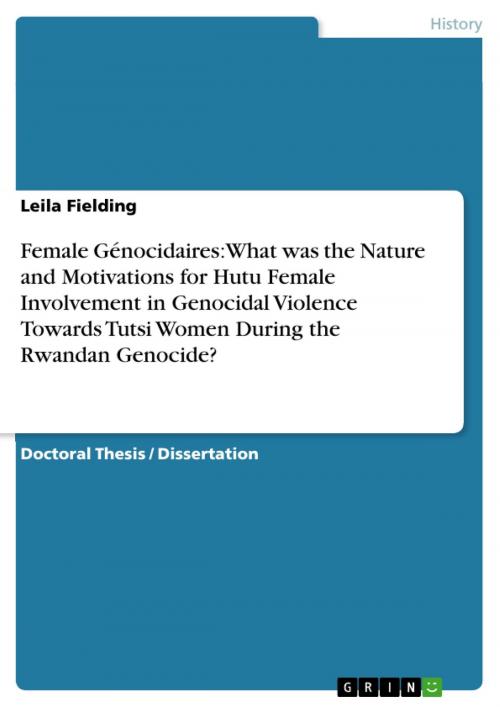Female Génocidaires: What was the Nature and Motivations for Hutu Female Involvement in Genocidal Violence Towards Tutsi Women During the Rwandan Genocide?
Nonfiction, History, Africa| Author: | Leila Fielding | ISBN: | 9783656323358 |
| Publisher: | GRIN Publishing | Publication: | November 28, 2012 |
| Imprint: | GRIN Publishing | Language: | English |
| Author: | Leila Fielding |
| ISBN: | 9783656323358 |
| Publisher: | GRIN Publishing |
| Publication: | November 28, 2012 |
| Imprint: | GRIN Publishing |
| Language: | English |
Doctoral Thesis / Dissertation from the year 2012 in the subject History - Africa, grade: First, Manchester Metropolitan University Business School, language: English, abstract: Victimisation of women in times of war, genocide or mass slaughter has been the primary focus of the majority of explorations concerning gender and conflict. Traditionally, women are espoused as victims, at the mercy of male killers and therefore subordinate. The notoriety of brutal, horrific and incomprehensible sexual crimes against women in times of genocide has ensured that reluctance in addressing female accountability has plagued this debate. While examinations of these atrocities are imperative and indispensable in facilitating reconciliation, both psychological and social, this one-sided representation has led to a misunderstanding of the dynamic roles which women play during genocide. Whether supportive, active or auxiliary roles, women have been a vital component in endorsing and sanctioning genocidal violence historically. In Rwanda, some women not only provided assistance and encouragement to Hutu men, but also perpetrated the attacks and incited rape. The suffering of female victims cannot be fully understood without a consideration of the extensive nature of the perpetrators, both male and female. Moreover, quite the opposite of diminishing the value and significance of the victimisation of women, any examination which focuses on female agency re-balances the scales of gender inequality and consequently serves to empower women. Women should not be portrayed solely as victims. Women in the Rwandan genocide were victims and perpetrators, agents and symbols. Gender expectations which propagate the superiority of men both during and after conflict are detrimental to the reconstruction of post-genocide gender identities.
Doctoral Thesis / Dissertation from the year 2012 in the subject History - Africa, grade: First, Manchester Metropolitan University Business School, language: English, abstract: Victimisation of women in times of war, genocide or mass slaughter has been the primary focus of the majority of explorations concerning gender and conflict. Traditionally, women are espoused as victims, at the mercy of male killers and therefore subordinate. The notoriety of brutal, horrific and incomprehensible sexual crimes against women in times of genocide has ensured that reluctance in addressing female accountability has plagued this debate. While examinations of these atrocities are imperative and indispensable in facilitating reconciliation, both psychological and social, this one-sided representation has led to a misunderstanding of the dynamic roles which women play during genocide. Whether supportive, active or auxiliary roles, women have been a vital component in endorsing and sanctioning genocidal violence historically. In Rwanda, some women not only provided assistance and encouragement to Hutu men, but also perpetrated the attacks and incited rape. The suffering of female victims cannot be fully understood without a consideration of the extensive nature of the perpetrators, both male and female. Moreover, quite the opposite of diminishing the value and significance of the victimisation of women, any examination which focuses on female agency re-balances the scales of gender inequality and consequently serves to empower women. Women should not be portrayed solely as victims. Women in the Rwandan genocide were victims and perpetrators, agents and symbols. Gender expectations which propagate the superiority of men both during and after conflict are detrimental to the reconstruction of post-genocide gender identities.















